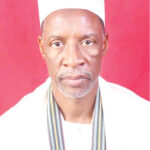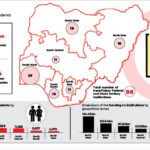- Says law enforcement investigating $2.4bn unauthorised fx transactions
- Decision putting undue pressure on banks – Expert
- BDC rate appreciates to N1,304/US
The Central Bank of Nigeria (CBN)’s Monetary Policy Committee (MPC) has for the second time in in four weeks, increased the benchmark interest rate.
The 294th MPC meeting held in Abuja yesterday increased the rate by 200 basis points from 22.75 per cent to 24.75 per cent, according to the CBN governor who doubles as Chairman of the MPC.
The apex bank also retained the Cash Reserve Ratio (CRR) at 45 per cent, unchanged from its last meeting but increased the CRR of merchant banks from 10 per cent to 14 per cent while retaining the liquidity ratio at 30 per cent.
Effect of MPR hike on the FX rate and inflation
The CBN governor, Yemi Cardoso, said since the February MPC meeting, there has been a notable appreciation and stabilisation in the exchange rate between the US dollar and the naira.
During the interval between the last MPC meeting and the present, the exchange rate momentarily peaked at N1800/$ in the parallel market but has since settled around 1400/$.
Conversely, the inflation rate during this period has not shown the same stability. In February, Nigeria’s headline inflation surged to 31.7 per cent, primarily driven by escalating food prices, with food inflation climbing to 35.92 per cent. This marks an ascent of 1.80 per cent from the 29.90 per cent inflation rate recorded before the February MPC gathering.
Cardoso said: “From our perspective, the key thing for us as a central bank is to be fully focused on our core mandate and that is to fight inflation and to ensure price stability. So, there is no ambiguity in that and there is no compromise on that.
“We are very concerned that the purchasing power of the average Nigerian should be restored to the levels that they know it to be.
“Going forward, we expect that if the environment is such that requires us to tighten, we will tighten. Our projections, however, indicate that things will begin to moderate from about May onwards and the projection, as you may know, is that by the end of the year, we are expecting the inflationary rates to have come down significantly.”
Is the CBN trading growth to fight inflation?
There have been concerns by economic experts that the increase would hurt the real sector of the economy which is already contending with numerous macroeconomic challenges.
Analysts have contended that the current metrics pose a major risk to the financial intermediation role of banks in the Nigerian economy.
Cardoso, in his defence, said with respect to growth, there appears to be a trade-off of some sort, “but the good news is that we expect the tightening to not be long-drawn. We don’t expect this to be something that will subsist too long into the future. Of course, if the right responses happen in the economy, then I have no doubt that the MPC will take the decision it has to take, to properly ensure that the situation into the future is able to take the growth considerations adequately, as they should be.”
Law enforcement investigating $2.4bn unauthorised fx transactions
The CBN governor, in responding to concerns raised by the organised private sector that their funds have been retained by the commercial banks for an extended period, in some cases for over one year without the forex been provided, noted that law enforcement authorities are currently conducting an investigation into $2.4 billion worth of unauthorised foreign exchange transactions.
He noted that the examination is focusing on numerous transactions that did not adhere to the regulatory standards established by the CBN for foreign exchange allocations.
Cardoso highlighted various irregularities, such as the disbursement of large sums of FX for requests that were never submitted and allocations made without the necessary naira backing. He highlighted the absence of legal validity and adequate documentation in these transactions.
Cardoso emphasised the gravity of these irregularities, labeling numerous transactions under investigation as “clearly unlawful.”
“We determine that a number of these transactions did not qualify. In some cases, we have some allocations made in millions of dollars, which were never requested for; we also heard somewhere they had no naira and they were also allocated some foreign exchange.
“It was for that reason that we refused to validate those particular transactions. Apart from the fact that documentation was not satisfactory, in many cases, they were outright illegal. The law enforcement agencies are now looking into those transactions that as far as we are concerned, are not valid to be paid,” he said.
Fx allocation to BDCs will not distort free price discovery
Cardoso also addressed concerns around the recent re-commencement of forex allocation to BDCs.
He said the apex bank is painstaking in ensuring that it removes as many of the distortions that proved in the way of the rates, finding the right level of price discovery.
He said: “In all, this is the importance of liquidity because, if there is not enough liquidity going in and out of the market, then obviously that in itself can pose a problem.
“The idea is by no means to establish any price, but at least to catalyse the demand and supply equation in such a way that the market gets its own confidence; price discovery is established and people get used to that and once that becomes a regular occurrence, then we expect that we will find the need for the central bank to come in will be significantly reduced or eliminated.”
Cardoso argued that, “Whatever we see on the interest rate side, which is being used to help moderate prices, buys us time to ensure that the fiscal side can do all the things that it is already doing and ensures a more sustainable economy where the need to depend too much on hiking interest rates is considerably low.
Much as tightening is necessary at this time in view of elevated inflation, MPC should tighten policy incrementally and in a measured manner that optimises the CBN’s policy tool kit without undue reliance on the monetary policy rate.
MPC decision is putting undue pressure on banks, increasing cost of funds – Expert
A professor of finance and capital market at the Nasarawa State University, Uche Uwaleke, in his reaction said the decision by the MPC to increase the MPR by 200 bps makes it a total of 600 bps in just one month if one adds the 400-bps delivered in February.
This is in addition to a very high CRR of 45 per cent representing sterilised bank deposits.
He said: “This development is now driving undue pressure by banks on the CBN’s Standing Lending Facility and increasing cost of funds generally.
“The CBN should recognise that the challenge currently facing the Nigerian economy is not just inflation but stagflation and to this end should equally have regard to growth concerns in future meetings of the MPC.”
Dr Biodun Adedipe, an economist, and Chief Consultant, Biodun Adedipe Consult, while speaking on the impact of Inflation said: “The Monetary Policy Authorities need to focus on inflation ahead of growth as a trade-off and get it to a threshold that is comfortable in the country and to the level of the 2024 federal government’s assumption of 21 per cent.”
He noted that the current headline inflation rate of 31.70 per cent is unprecedented and at an emergency level in the country’s history.
BDC rate appreciates to N1,304/US
Meanwhile, the naira continued to strengthen at the parallel market as the NAFEX rate appreciated by 0.15% from N1,422.85/USD to N1,420.76/USD, while the BDC rate appreciated by 10.43% from N1,440/USD to N1,304/USD.
This is coming on the heels of the CBN issuing a circular to Bureau De Change operators (BDCs), informing that it has sold $10,000 to each BDC at a rate of N1,251/$1.

 Join Daily Trust WhatsApp Community For Quick Access To News and Happenings Around You.
Join Daily Trust WhatsApp Community For Quick Access To News and Happenings Around You.


